

Our Watery World. Solutions to the Global Water Crisis: 10 Takeaways From The World Water Forum (Photo Credit ultimahora.es) We cannot exist without water.
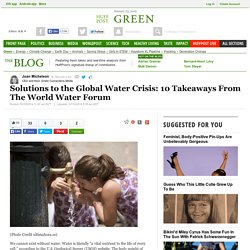
Water is literally "a vital nutrient to the life of every cell," according to the U.S. Geological Survey (USGS) website. The body weight of some organisms is as much as 90 percent water. The human body is up to 60 percent water, "the brain and heart are composed of 73 percent water," while our "lungs are about 83 percent water," our skin is 64 percent, our muscles and kidneys are 79 percent, and our bones are about 31 percent water. Water scarcity is very scary (is there a connection between the word "scarcity" and "scary"?) The World Water Forum 2014 About 130 of the best and brightest minds across sectors came together at the 7th World Water Forum on May 15, 2014 on Washington, D.C. to share solutions and build partnerships, courtesy of the World Wildlife Fund, The Coca Cola Company, and the World Water Council.
Here are ten keys to addressing the global water crisis from the Forum: 1. 2. 3. 4. 5. 6. 7. Experts Name the Top 19 Solutions to the Global Freshwater Crisis. This week we continue counting down the 19 best solutions to the global freshwater crisis captured by a GlobeScan and SustainAbility poll of more than 1200 leading international experts in 80 countries.
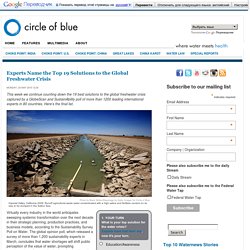
Here’s the final list. Photo by Brent Stirton/Reportage by Getty Images for Circle of Blue Imperial Valley, California 2009: Runoff agricultural waste water contaminated with a high saline and fertilizer content on its way to be dumped in the Salton Sea. <br /><a href=" onclick="_gaq.push(['_trackEvent', 'outbound-article', ' 'What is your top solution for the water crisis']);" >What is your top solution for the water crisis</a><br /> Virtually every industry in the world anticipates sweeping systemic transformation over the next decade in their strategic planning, production practices, and business models, according to the Sustainability Survey Poll on Water. Recycle wastewater In March, World Water Day panelists urged a new mindset for wastewater treatment. Global water scarcity information for young people.
Walking for Water. Water in de Derde Wereld. Geen werk voor mannenIn de meeste derdewereldlanden is water halen een taak voor vrouwen en kinderen.
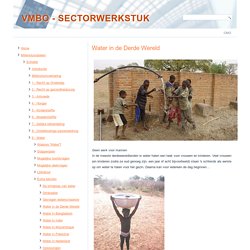
Veel vrouwen (en kinderen zodra ze oud genoeg zijn, een jaar of acht bijvoorbeeld) staan 's ochtends als eerste op om water te halen voor het gezin. Daarna kan voor iedereen de dag beginnen... Het vreemde is dat vrouwen meestal verantwoordelijk zijn voor het halen van water, maar dat ze over watergebruik vaak niets te vertellen heeft. Op waterconferenties zie je vooral mannen in dure pakken rondlopen. En als er een waterproject komt, zijn het vaak de mannen die beslissen over het aanleggen van een waterpomp of waterleiding. VMBO-Sectorwerkstuk. Waterschaarste is het gebrek aan voldoende (schoon) drinkwater.
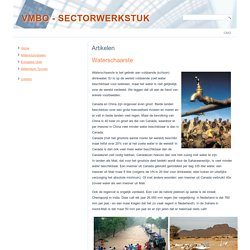
Issues › Water. Health and Sanitation Diseases from unsafe water and lack of basic sanitation kill more people every year than all forms of violence, including war.
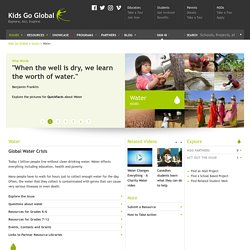
Children are especially vulnerable, as their bodies aren't strong enough to fight diarrhea, dysentery and other illnesses. With basic education about proper sanitation, such as hand-washing and the use of latrines, many fatal diseases can be avoided. Women and Children The work of collecting water usually falls to the women and children of the family. The time that is spent walking to collect water is not only a dangerous time for them, but is also time that is not spent learning to read and write, making an income, or caring for the younger children in the family. Poverty When family members get sick from contaminated water or poor sanitation this means money must be spent on doctors bills and more time will be spent away from any income making activities.
Clean Water Crisis, Water Crisis Facts, Water Crisis Resources. A Clean Water Crisis The water you drink today has likely been around in one form or another since dinosaurs roamed the Earth, hundreds of millions of years ago.

While the amount of freshwater on the planet has remained fairly constant over time—continually recycled through the atmosphere and back into our cups—the population has exploded. This means that every year competition for a clean, copious supply of water for drinking, cooking, bathing, and sustaining life intensifies. Water scarcity is an abstract concept to many and a stark reality for others.
It is the result of myriad environmental, political, economic, and social forces. Freshwater makes up a very small fraction of all water on the planet. Due to geography, climate, engineering, regulation, and competition for resources, some regions seem relatively flush with freshwater, while others face drought and debilitating pollution. Global Water Shortage: Water Scarcity & The Importance of Water. Facts: Water. Water 1 in 10 people lack access to safe water Sanitation 1 in 3 people lack access to a toilet Women & Children.
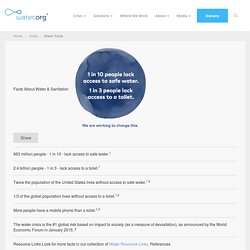
Virtual Water - Discover how much WATER we EAT everyday. The good news is that each one of us can also make the world a little more water secure, ready to face the needs of our peak population future.
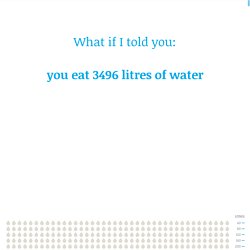
How? The answer lies in our shopping baskets. The amount of meat in our diet is crucial! The average daily water consumption of a meat-eating person is 5000 litres of water per day. The average for a vegetarian is 2500 litres. The type of meat we consume is crucial! The food we waste is crucial! So, do not forget: one meat-free-day a week choose meat raised on grass do not waste food.